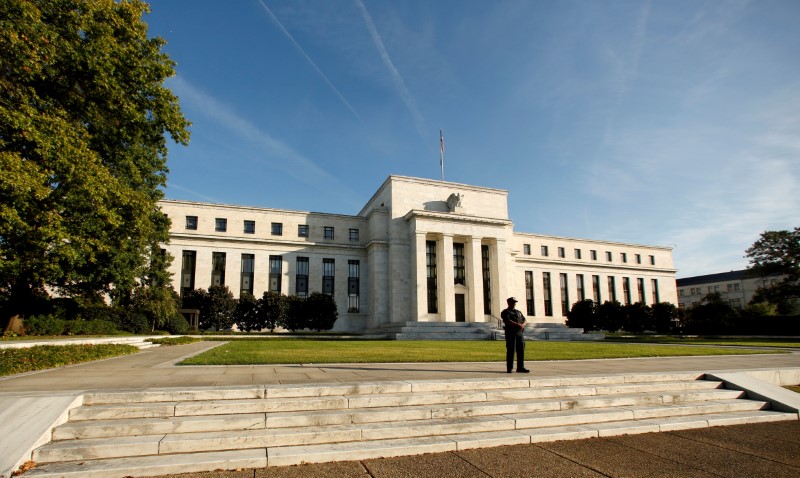By Shrutee Sarkar
BENGALURU (Reuters) - The U.S. Federal Reserve will announce plans to shrink its more than $4 trillion balance sheet in September, according to a Reuters poll of economists who also said the central bank will wait until the fourth quarter before raising rates again.
Results in the survey are in line with what Fed officials have hinted at in recent weeks, even as they are split on the outlook for inflation and how the lack of it might affect the future pace of interest rate hikes.
"The idea is that they (the Fed) announce balance sheet shrinkage at the September meeting and then hike in December. I think they have almost pre-announced those two decisions," said Ethan Harris, head of global economics at Bank of America Merrill Lynch (NYSE:BAC).
In a poll conducted just last month, predictions were for the Fed to raise rates by September.
But expectations have now been pushed back by a quarter, with the consensus from the latest poll of over 100 economists predicting the fed funds rate to climb to a range of 1.25-1.50 percent by the end of this year.
Financial markets are pricing in only a 43 percent chance of a 25 basis point rate hike in December. That is largely because recent U.S. economic data have been weaker than expected, especially inflation.
The dollar too has taken a beating against a basket of currencies and was last trading near a 10-month low.
The Fed has raised rates twice so far this year.
So while the Fed pauses for the next opportunity to raise rates, about two-thirds of economists say the central bank is expected to announce the course of action it will take to unwind its massive bonds portfolio in September.
Most of those who answered another question in the poll said if the Fed does so, it will not be acting too soon. (For a graphic on those expectations: http://reut.rs/2txiV89)
But not everyone was convinced.
"We are a little bit concerned that the Fed is getting ahead of itself. We don't agree with the idea that the Fed seems to be selling that balance sheet shrinkage is something we should not be focused on, and it will simply occur in the background," said BofA-ML's Harris.
"In a sense, they are setting aside one of their policy tools on auto-pilot. I don't think they should be doing that."
Only a handful of economists expect the central bank to announce its balance sheet unwinding plan when it meets on July 25-26. The consensus was for the central bank to stand pat on rates too at that meeting.
INFLATION OUTLOOK SLIPS
The labor market remains strong, with the unemployment rate at 4.4 percent. But weak wage growth and cooling inflation will probably keep the Fed wary of raising rates again soon.
The Reuters poll consensus for core PCE inflation, the gauge the Fed closely watches, was 1.5-1.6 percent each quarter from here until the end of the year, slightly lower than 1.6-1.7 percent expected last month.
Growth has not picked up as previously thought either and is now expected to be modest at best for this year and next.
The economy is forecast to have grown at a 2.7 percent pace in the second quarter and then to advance at an annualized rate of 2.2-2.5 percent each quarter to the end of next year, according to the poll median.
Fed Chair Janet Yellen said at a Senate committee hearing last week that it would be "quite challenging" for the United States to reach the 3 percent growth target set by President Donald Trump's administration.
Several Reuters polls this year have been clear that the chances of 3 percent U.S. economic growth this year were low.
While the Fed has been more sanguine than markets about inflation picking up, policymakers will move cautiously.
"Fed officials believe that market participants are underappreciating the inflation implications of the downtrend in the unemployment rate, and that they have overreacted to some weaker-than-expected inflation data," noted Jim O'Sullivan of High Frequency Economics, the top forecaster for U.S. economic data in Reuters polls in 2016 for the second year in a row.
"However, Fed officials will not follow through on their policy projections if the labor market weakens and the recent slowing in core inflation continues," O'Sullivan wrote in a note.

(Analysis and polling by Indradip Ghosh and Vivek Mishra; Editing by Ross Finley and Andrea Ricci)